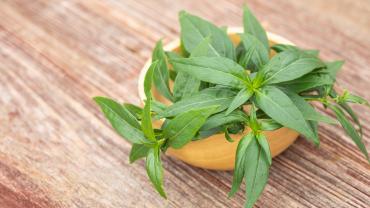
Andrographis paniculata, also known as the King of Bitters, has a long tradition of medicinal use in Asia and Europe for a range of illnesses, including infections, inflammation, colds, fevers, diarrhea, and dysentery. Due to its history, researchers are investigating this herb to determine its efficacy in supporting immune health.
A. paniculata and other members of the Andrographis family support the immune response in two main ways: antimicrobial properties and immunomodulatory mechanisms. Andrographis has the potential to help disrupt pathogenic bacteria by inhibiting biofilm formation, bacterial communication systems, virulence factors, and bacterial adhesion, and by destroying the integrity of the bacteria. In addition, A. paniculata is immunomodulatory and anti-inflammatory, and it maintains the structure of the cytoskeleton. It can also help complement antibiotic treatment by potentially restoring the sensitivity of the antibiotics to the bacteria.
While this herb contains many beneficial phytochemicals, including flavonoids, the major constituent influencing its ability to fight bacteria and support immune function is andrographolide and its analogs. Andrographolide exhibits antimicrobial, antioxidant, and anti-inflammatory properties.
Andrographolide has been shown to act as an antioxidant by binding the adenosine A2A receptor to induce Nrf2 translocation, which in turn inactivates GSK3-beta and upregulates heme oxygenase 1. Andrographolide regulates protein expression to support a normal inflammatory response, including that produced by lipopolysaccharides from Gram-negative bacteria, by inducing the release of nitric oxide, which is a mediator of inflammation, and by inhibiting the release of inflammatory cytokines such as interleukin (IL)-1 beta and IL-6. It also modulates the cyclooxygenase pathway and nuclear factor-kappa B, both of which regulate the immune system and inflammation.
An in vitro study of andrographolide from A. paniculata demonstrated an antibacterial effect on a variety of bacteria including Staphylococcus aureus, Streptococcus thermophilus, Bacillus subtiltis, Escherichia coli, Mycobacterium smegmatis, Klebsiella pneumonia, and Pseudomonas aeruginosa. The concentration necessary for it to work differed depending on the type of bacteria. For example, a low concentration of 50 ug/mL inhibited E. coli, whereas S. thermophilus required 350 ug/mL of andrographolide for minimal inhibition.
It is not just bacteria against which andrographis may prove beneficial; studies have also found that andrographis may be able to inhibit viruses including influenza. Although many studies focused on its antimicrobial properties in vitro, human studies have demonstrated efficacy in supporting symptomatic relief. A systematic review and meta-analysis found that A. paniculata was beneficial in supporting the treatment of acute respiratory tract infections, including those caused by antibacterial-resistant bacteria. In the studies included in this review, the herb was found to help improve coughs and sore throats compared to a placebo. This herb also led to a statistically significant improvement in overall symptoms compared to a placebo. Compared with usual care (symptomatic relief with analgesics and decongestants), A. paniculata was also found to shorten the duration of many of the symptoms and overall illness.
The antimicrobial and immunomodulating properties of this traditional herbal remedy make it a potential option for supporting the treatment of certain infectious and chronic diseases.
By Kendra Whitmire, MS, CNS